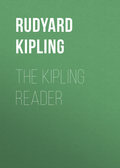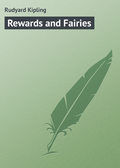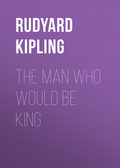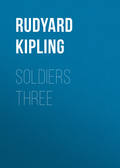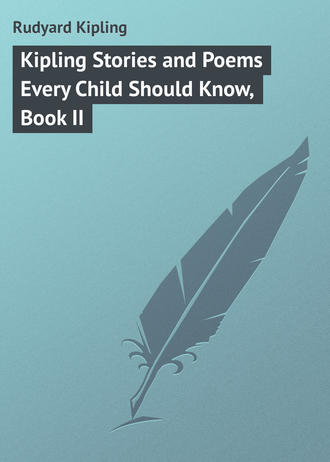
Редьярд Джозеф Киплинг
Kipling Stories and Poems Every Child Should Know, Book II
"Ye were still when they polluted my waters," the great Crocodile bellowed. "Ye made no sign when my river was trapped between the walls. I had no help save my own strength, and that failed – the strength of Mother Gunga failed – before their guard-towers. What could I do? I have done everything. Finish now, Heavenly Ones!"
"I brought the death; I rode the spotted sickness from hut to hut of their workmen, and yet they would not cease." A nose-slitten, hide-worn Ass, lame, scissor-legged, and galled, limped forward. "I cast the death at them out of my nostrils, but they would not cease."
Peroo would have moved, but the opium lay heavy upon him.
"Bah!" he said, spitting. "Here is Sitala herself; Mata – the small-pox. Has the Sahib a handkerchief to put over his face?"
"Small help! They fed me the corpses for a month, and I flung them out on my sand-bars, but their work went forward! Demons they are, and so sons of demons! And ye left Mother Gunga alone for their fire-carriage to make a mock of. The Justice of the Gods on the bridge-builders!"
The Bull turned the cud in his mouth and answered slowly, "If the Justice of the Gods caught all who made a mock of holy things, there would be many dark altars in the land, mother."
"But this goes beyond a mock," said the Tigress, darting forward a griping paw. "Thou knowest, Shiv, and ye, too, Heavenly Ones; ye know that they have defiled Gunga. Surely they must come to the Destroyer. Let Indra judge."
The Buck made no movement as he answered, "How long has this evil been?"
"Three years, as men count years," said the Mugger, close pressed to the earth.
"Does Mother Gunga die, then, in a year, that she is so anxious to see vengeance now? The deep sea was where she runs but yesterday, and to-morrow the sea shall cover her again as the Gods count that which men call time. Can any say that this their bridge endures till to-morrow?" said the Buck.
There was a long hush, and in the clearing of the storm the full moon stood up above the dripping trees.
"Judge ye, then," said the River sullenly. "I have spoken my shame. The flood falls still. I can do no more."
"For my own part" – it was the voice of the great Ape seated within the shrine – "it pleases me well to watch these men, remembering that I also builded no small bridge in the world's youth."
"They say, too," snarled the Tiger, "that these men came of the wreck of thy armies, Hanuman, and therefore thou hast aided – "
"They toil as my armies toiled in Lanka, and they believe that their toil endures. Indra is too high, but Shiv, thou knowest how the land is threaded with their fire-carriages."
"Yea, I know," said the Bull. "Their Gods instructed them in the matter."
A laugh ran round the circle.
"Their Gods! What should their Gods know? They were born yesterday, and those that made them are scarcely yet cold," said the Mugger. "To-morrow their Gods will die."
"Ho!" said Peroo. "Mother Gunga talks good talk. I told that to the padre-sahib who preached on the Mombassa, and he asked the Burra Malum to put me in irons for a great rudeness."
"Surely they make these things to please their Gods," said the Bull again.
"Not altogether," the Elephant rolled forth. "It is for the profit of my mahajuns – my fat money-lenders that worship me at each new year, when they draw my image at the head of the account-books. I, looking over their shoulders by lamplight, see that the names in the books are those of men in far places – for all the towns are drawn together by the fire-carriage, and the money comes and goes swiftly, and the account-books grow as fat as – myself. And I, who am Ganesh of Good Luck, I bless my peoples."
"They have changed the face of the land – which is my land. They have killed and made new towns on my banks," said the Mugger.
"It is but the shifting of a little dirt. Let the dirt dig in the dirt if it pleases the dirt," answered the Elephant.
"But afterward?" said the Tiger. "Afterward they will see that Mother Gunga can avenge no insult, and they fall away from her first, and later from us all, one by one. In the end, Ganesh, we are left with naked altars."
The drunken Man staggered to his feet, and hiccupped vehemently in the face of the assembled Gods.
"Kali lies. My sister lies. Also this my stick is the Kotwal of Kashi, and he keeps tally of my pilgrims. When the time comes to worship Bhairon – and it is always time – the fire-carriages move one by one, and each bears a thousand pilgrims. They do not come afoot any more, but rolling upon wheels, and my honour is increased."
"Gunna, I have seen thy bed at Pryag black with the pilgrims," said the Ape, leaning forward "and but for the fire-carriage they would have come slowly and in fewer numbers. Remember."
"They come to me always," Bhairon went on thickly. "By day and night they pray to me, all the Common People in the fields and the roads. Who is like Bhairon to-day? What talk is this of changing faiths? Is my staff Kotwal of Kashi for nothing? He keeps the tally, and he says that never were so many altars as to-day, and the fire-carriage serves them well. Bhairon am I – Bhairon of the Common People, and the chiefest of the Heavenly Ones to-day. Also my staff says – "
"Peace, thou!" lowed the Bull. "The worship of the schools is mine, and they talk very wisely, asking whether I be one or many, as is the delight of my people, and ye know what I am. Kali, my wife, thou knowest also."
"Yea, I know," said the Tigress, with lowered head.
"Greater am I than Gunga also. For ye know who moved the minds of men that they should count Gunga holy among the rivers. Who die in that water – ye know how men say – come to us without punishment, and Gunga knows that the fire-carriage has borne to her scores upon scores of such anxious ones; and Kali knows that she has held her chiefest festivals among the pilgrimages that are fed by the fire-carriage. Who smote at Pooree, under the Image there, her thousands in a day and a night, and bound the sickness to the wheels of the fire-carriages, so that it ran from one end of the land to the other? Who but Kali? Before the fire-carriage came it was a heavy toil. The fire-carriages have served thee well, Mother of Death. But I speak for mine own altars, who am not Bhairon of the Common Folk, but Shiv. Men go to and fro, making words and telling talk of strange Gods, and I listen. Faith follows faith among my people in the schools, and I have no anger; for when the words are said, and the new talk is ended, to Shiv men return at the last."
"True. It is true," murmured Hanuman. "To Shiv and to the others, mother, they return. I creep from temple to temple in the North, where they worship one God and His Prophet; and presently my image is alone within their shrines."
"Small thanks," said the Buck, turning his head slowly. "I am that One and His Prophet also."
"Even so, father," said Hanuman. "And to the South I go who am the oldest of the Gods as men know the Gods, and presently I touch the shrines of the new faith and the Woman whom we know is hewn twelve-armed, and still they call her Mary."
"Small thanks, brother," said the Tigress. "I am that Woman."
"Even so, sister; and I go West among the fire-carriages, and stand before the bridge-builder in many shapes, and because of me they change their faiths and are very wise. Ho! ho! I am the builder of bridges, indeed – bridges between this and that, and each bridge leads surely to Us in the end. Be content, Gunga. Neither these men nor those that follow them mock thee at all."
"Am I alone, then, Heavenly Ones? Shall I smooth out my flood lest unhappily I bear away their walls? Will Indra dry my springs in the hills and make me crawl humbly between their wharfs? Shall I bury me in the sand ere I offend?"
"And all for the sake of a little iron bar with the fire-carriage atop. Truly, Mother Gunga is always young!" said Ganesh the Elephant. "A child had not spoken more foolishly. Let the dirt dig in the dirt ere it return to the dirt. I know only that my people grow rich and praise me. Shiv has said that the men of the schools do not forget; Bhairon is content for his crowd of the Common People; and Hanuman laughs."
"Surely I laugh," said the Ape. "My altars are few beside those of Ganesh or Bhairon, but the fire-carriages bring me new worshippers from beyond the Black Water – the men who believe that their God is toil. I run before them beckoning, and they follow Hanuman."
"Give them the toil that they desire, then," said the River. "Make a bar across my flood and throw the water back upon the bridge. Once thou wast strong in Lanka, Hanuman. Stoop and lift my bed."
"Who gives life can take life." The Ape scratched in the mud with a long forefinger. "And yet, who would profit by the killing? Very many would die."
There came up from the water a snatch of a love-song such as the boys sing when they watch their cattle in the noon heats of late spring. The Parrot screamed joyously, sidling along his branch with lowered head as the song grew louder, and in a patch of clear moonlight stood revealed the young herd, the darling of the Gopis, the idol of dreaming maids and of mothers ere their children are born – Krishna the Well-beloved. He stooped to knot up his long, wet hair, and the parrot fluttered to his shoulder.
"Fleeting and singing, and singing and fleeting," hiccupped Bhairon. "Those make thee late for the council, brother."
"And then?" said Krishna, with a laugh, throwing back his head. "Ye can do little without me or Karma here." He fondled the Parrot's plumage and laughed again. "What is this sitting and talking together? I heard Mother Gunga roaring in the dark, and so came quickly from a hut where I lay warm. And what have ye done to Karma, that he is so wet and silent? And what does Mother Gunga here? Are the heavens full that ye must come paddling in the mud beast-wise? Karma, what do they do?"
"Gunga has prayed for a vengeance on the bridge-builders, and Kali is with her. Now she bids Hanuman whelm the bridge, that her honour may be made great," cried the Parrot. "I waited here, knowing that thou wouldst come O my master!"
"And the Heavenly Ones said nothing? Did Gunga and the Mother of Sorrows out-talk them? Did none speak for my people?"
"Nay," said Ganesh, moving uneasily from foot to foot; "I said it was but dirt at play, and why should we stamp it flat?"
"I was content to let them toil – well content," said Hanuman.
"What had I to do with Gunga's anger?" said the Bull.
"I am Bhairon of the Common Folk, and this my staff is Kotwal of all Kashi. I spoke for the Common People."
"Thou?" The young God's eyes sparkled.
"Am I not the first of the Gods in their mouths to-day?" returned Bhairon, unabashed. "For the sake of the Common People I said – very many wise things which I have now forgotten – but this my staff – "
Krishna turned impatiently, saw the Mugger at his feet, and kneeling, slipped an arm round the cold neck. "Mother," he said gently, "get thee to thy flood again. The matter is not for thee. What harm shall thy honour take of this live dirt? Thou hast given them their fields new year after year, and by thy flood they are made strong. They come all to thee at the last. What need to slay them now? Have pity, mother, for a little – and it is only for a little."
"If it be only for a little – " the slow beast began.
"Are they Gods, then?" Krishna returned with a laugh, his eyes looking into the dull eyes of the River. "Be certain that it is only for a little. The Heavenly Ones have heard thee, and presently justice will be done. Go, now, mother, to the flood again. Men and cattle are thick on the waters – the banks fall – the villages melt because of thee."
"But the bridge – the bridge stands." The Mugger turned grunting into the undergrowth as Krishna rose.
"It is ended," said the Tigress, viciously. "There is no more justice from the Heavenly Ones. Ye have made shame and sport of Gunga, who asked no more than a few score lives."
"Of my people – who lie under the leaf-roofs of the village yonder – of the young girls, and the young men who sing to them," said Krishna. "And when all is done, what profit? To-morrow sees them at work. Ay, if ye swept the bridge out from end to end they would begin anew. Hear me! Bhairon is drunk always. Hanuman mocks his people with new riddles."
"Nay, but they are very old ones," the Ape said, laughing.
"Shiv hears the talk of the schools and the dreams of the holy men; Ganesh thinks only of his fat traders; but I – I live with these my people, asking for no gifts, and so receiving them hourly."
"And very tender art thou of thy people," said the Tigress.
"They are my own. The old women dream of me, turning in their sleep; the maids look and listen for me when they go to fill their lotahs by the river. I walk by the young men waiting without the gates at dusk, and I call over my shoulder to the white-beards. Ye know, Heavenly Ones, that I alone of us all walk upon the earth continually, and have no pleasure in our heavens so long as a green blade springs here, or there are two voices at twilight in the standing crops. Wise are ye, but ye live far off, forgetting whence ye came. So do I not forget. And the fire-carriage feeds your shrines, ye say? And the fire-carriages bring a thousand pilgrimages where but ten came in the old years? True. That is true to-day."
"But to-morrow they are dead, brother," said Ganesh.
"Peace!" said the Bull, as Hanuman leaned forward again. "And to-morrow, beloved – what of to-morrow?"
"This only. A new word creeping from mouth to mouth among the Common Folk – a word that neither man nor God can lay hold of – an evil word – a little lazy word among the Common Folk, saying (and none know who set that word afoot) that they weary of ye, Heavenly Ones."
The Gods laughed together softly. "And then, beloved?" they said.
"And to cover that weariness they, my people, will bring to thee, Shiv, and to thee, Ganesh, at first greater offerings and a louder noise of worship. But the word has gone abroad, and, after, they will pay fewer dues to your fat Brahmins. Next they will forget your altars, but so slowly that no man can say how his forgetfulness began."
"I knew – I knew! I spoke this also, but they would not hear," said the Tigress. "We should have slain – we should have slain!"
"It is too late now. Ye should have slain at the beginning, when the men from across the water had taught our folk nothing. Now my people see their work, and go away thinking. They do not think of the Heavenly Ones altogether. They think of the fire-carriage and the other things that the bridge-builders have done, and when your priests thrust forward hands asking alms, they give unwillingly a little. That is the beginning, among one or two, or five or ten – for I, moving among my people, know what is in their hearts."
"And the end, Jester of the Gods? What shall the end be?" said Ganesh.
"The end shall be as it was in the beginning, O slothful son of Shiv! The flame shall die upon the altars and the prayer upon the tongue till ye become little Gods again – Gods of the jungle – names that the hunters of rats and noosers of dogs whisper in the thicket and among the caves – rag-Gods, pot Godlings of the tree, and the village-mark, as ye were at the beginning. That is the end, Ganesh, for thee, and for Bhairon – Bhairon of the Common People."
"It is very far away," grunted Bhairon. "Also, it is a lie."
"Many women have kissed Krishna. They told him this to cheer their own hearts when the gray hairs came, and he has told us the tale," said the Bull, below his breath.
"Their Gods came, and we changed them. I took the woman and made her twelve-armed. So shall we twist all their Gods," said Hanuman.
"Their Gods! This is no question of their Gods – one or three – man or woman. The matter is with the people. They move, and not the Gods of the bridge-builders," said Krishna.
"So be it. I have made a man worship the fire-carriage as it stood still breathing smoke, and he knew not that he worshipped me," said Hanuman the Ape. "They will only change a little the names of their Gods. I shall lead the builders of the bridges as of old; Shiv shall be worshipped in the schools by such as doubt and despise their fellows; Ganesh shall have his mahajuns, and Bhairon the donkey-drivers, the pilgrims, and the sellers of toys. Beloved, they will do no more than change the names, and that we have seen a thousand times."
"Surely they will do no more than change the names," echoed Ganesh: but there was an uneasy movement among the Gods.
"They will change more than the names. Me alone they cannot kill, so long as maiden and man meet together or the spring follows the winter rains. Heavenly Ones, not for nothing have I walked upon the earth. My people know not now what they know; but I, who live with them, I read their hearts. Great Kings, the beginning of the end is born already. The fire-carriages shout the names of new Gods that are not the old under new names. Drink now and eat greatly! Bathe your faces in the smoke of the altars before they grow cold! Take dues and listen to the cymbals and the drums, Heavenly Ones, while yet there are flowers and songs. As men count time the end is far off; but as we who know reckon it is to-day. I have spoken."
The young God ceased, and his brethren looked at each other long in silence.
"This I have not heard before," Peroo whispered in his companion's ear. "And yet sometimes, when I oiled the brasses in the engine-room of the Goorkha, I have wondered if our priests were so wise – so wise. The day is coming, Sahib. They will be gone by the morning."
A yellow light broadened in the sky, and the tone of the river changed as the darkness withdrew.
Suddenly the Elephant trumpeted aloud as though men had goaded him.
"Let Indra judge. Father of all, speak thou! What of the things we have heard? Has Krishna lied indeed? Or – "
"Ye know," said the Buck, rising to his feet. "Ye know the Riddle of the Gods. When Brahm ceases to dream the Heavens and the Hells and Earth disappear. Be content. Brahm dreams still. The dreams come and go, and the nature of the dreams changes, but still Brahm dreams. Krishna has walked too long upon earth, and yet I love him the more for the tale he has told. The Gods change, beloved – all save One!"
"Ay, all save one that makes love in the hearts of men," said Krishna, knotting his girdle. "It is but a little time to wait, and ye shall know if I lie."
"Truly it is but a little time, as thou sayest, and we shall know. Get thee to thy huts again, beloved, and make sport for the young things, for still Brahm dreams. Go, my children! Brahm dreams – and till He wakes the Gods die not."
"Whither went they?" said the Lascar, awe-struck, shivering a little with the cold.
"God knows!" said Findlayson. The river and the island lay in full daylight now, and there was never mark of hoof or pug on the wet earth under the peepul. Only a parrot screamed in the branches, bringing down showers of water-drops as he fluttered his wings.
"Up! We are cramped with cold! Has the opium died out? Canst thou move, Sahib?"
Findlayson staggered to his feet and shook himself. His head swam and ached, but the work of the opium was over, and, as he sluiced his forehead in a pool, the Chief Engineer of the Kashi Bridge was wondering how he had managed to fall upon the island, what chances the day offered of return, and, above all, how his work stood.
"Peroo, I have forgotten much. I was under the guard-tower watching the river; and then – Did the flood sweep us away?"
"No. The boats broke loose, Sahib, and" (if the Sahib had forgotten about the opium, decidedly Peroo would not remind him) "in striving to retie them, so it seemed to me – but it was dark – a rope caught the Sahib and threw him upon a boat. Considering that we two, with Hitchcock Sahib, built, as it were, that bridge, I came also upon the boat, which came riding on horseback, as it were, on the nose of this island, and so, splitting, cast us ashore. I made a great cry when the boat left the wharf, and without doubt Hitchcock Sahib will come for us. As for the bridge, so many have died in the building that it cannot fall."
A fierce sun, that drew out all the smell of the sodden land, had followed the storm, and in that clear light there was no room for a man to think of dreams of the dark. Findlayson stared up-stream, across the blaze of moving water, till his eyes ached. There was no sign of any bank to the Ganges, much less of a bridge-line.
"We came down far," he said. "It was wonderful that we were not drowned a hundred times."
"That was the least of the wonder, for no man dies before his time. I have seen Sydney, I have seen London, and twenty great ports, but" – Peroo looked at the damp, discoloured shrine under the peepul – "never man has seen that we saw here."
"What?"
"Has the Sahib forgotten; or do we black men only see the Gods?"
"There was a fever upon me." Findlayson was still looking uneasily across the water. "It seemed that the island was full of beasts and men talking, but I do not remember. A boat could live in this water now, I think."
"Oho! Then it is true. 'When Brahm ceases to dream, the Gods die.' Now I know, indeed, what he meant. Once, too, the guru said as much to me; but then I did not understand. Now I am wise."
"What?" said Findlayson over his shoulder.
Peroo went on as if he were talking to himself. "Six – seven – ten monsoons since, I was watch on the fo'c'sle of the Rewah– the Kumpani's big boat – and there was a big tufan, green and black water beating; and I held fast to the life-lines, choking under the waters. Then I thought of the Gods – of Those whom we saw to-night" – he stared curiously at Findlayson's back, but the white man was looking across the flood. "Yes, I say of Those whom we saw this night past, and I called upon Them to protect me. And while I prayed, still keeping my lookout, a big wave came and threw me forward upon the ring of the great black bow-anchor, and the Rewah rose high and high, leaning toward the left-hand side, and the water drew away from beneath her nose, and I lay upon my belly, holding the ring, and looking down into those great deeps. Then I thought, even in the face of death, if I lose hold I die, and for me neither the Rewah nor my place by the galley where the rice is cooked, nor Bombay, nor Calcutta, nor even London, will be any more for me. 'How shall I be sure,' I said, 'that the Gods to whom I pray will abide at all?' This I thought, and the Rewah dropped her nose as a hammer falls, and all the sea came in and slid me backward along the fo'c'sle and over the break of the fo'c'sle, and I very badly bruised my shin against the donkey-engine: but I did not die, and I have seen the Gods. They are good for live men, but for the dead – They have spoken Themselves. Therefore, when I come to the village I will beat the guru for talking riddles which are no riddles. When Brahm ceases to dream, the Gods go."
"Look up-stream. The light blinds. Is there smoke yonder?"
Peroo shaded his eyes with his hands. "He is a wise man and quick. Hitchcock Sahib would not trust a rowboat. He has borrowed the Rao Sahib's steam-launch, and comes to look for us. I have always said that there should have been a steam-launch on the bridge-works for us."
The territory of the Rao of Baraon lay within ten miles of the bridge; and Findlayson and Hitchcock had spent a fair portion of their scanty leisure in playing billiards and shooting Black-buck with the young man. He had been bear-led by an English tutor of sporting tastes for some five or six years, and was now royally wasting the revenues accumulated during his minority by the Indian Government. His steam-launch, with its silver-plated rails, striped silk awning, and mahogany decks, was a new toy which Findlayson had found horribly in the way when the Rao came to look at the bridge-works.
"It's great luck," murmured Findlayson, but he was none the less afraid, wondering what news might be of the bridge.
The gaudy blue and white funnel came down-stream swiftly. They could see Hitchcock in the bows, with a pair of opera-glasses, and his face was unusually white. Then Peroo hailed, and the launch made for the tail of the island. The Rao Sahib, in tweed shooting-suit and a seven-hued turban, waved his royal hand, and Hitchcock shouted. But he need have asked no questions, for Findlayson's first demand was for his bridge.
"All serene! 'Gad, I never expected to see you again, Findlayson. You're seven koss down-stream. Yes, there's not a stone shifted anywhere; but how are you? I borrowed the Rao Sahib's launch, and he was good enough to come along. Jump in."
"Ah, Finlinson, you are very well, eh? That was most unprecedented calamity last night, eh? My royal palace, too, it leaks like the devil, and the crops will also be short all about my country. Now you shall back her out, Hitchcock. I – I do not understand steam-engines. You are wet? You are cold Finlinson? I have some things to eat here, and you will take a good drink."
"I'm immensely grateful, Rao Sahib. I believe you've saved my life. How did Hitchcock – "
"Oho! His hair was upon end. He rode to me in the middle of the night and woke me up in the arms of Morphus. I was most truly concerned, Finlinson, so I came too. My head-priest he is very angry just now. We will go quick, Mister Hitchcock. I am due to attend at twelve-forty-five in the state temple, where we sanctify some new idol. If not so I would have asked you to spend the day with me. They are dam-bore, these religious ceremonies, Finlinson, eh?"
Peroo, well known to the crew, had possessed himself of the wheel, and was taking the launch craftily up-stream. But while he steered he was, in his mind, handling two feet of partially untwisted wire-rope; and the back upon which he beat was the back of his guru.



